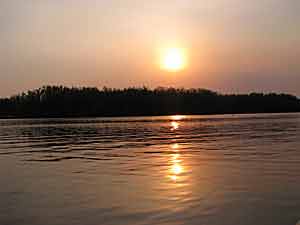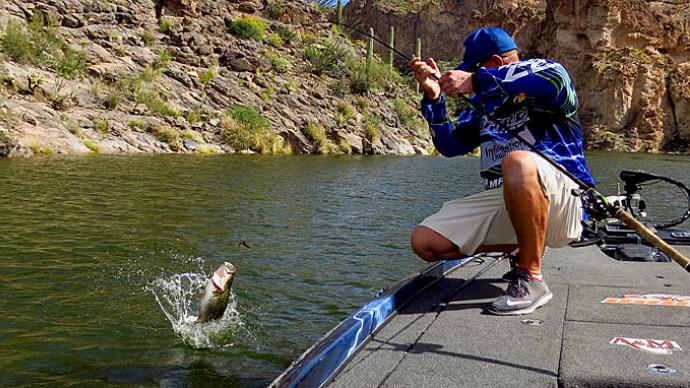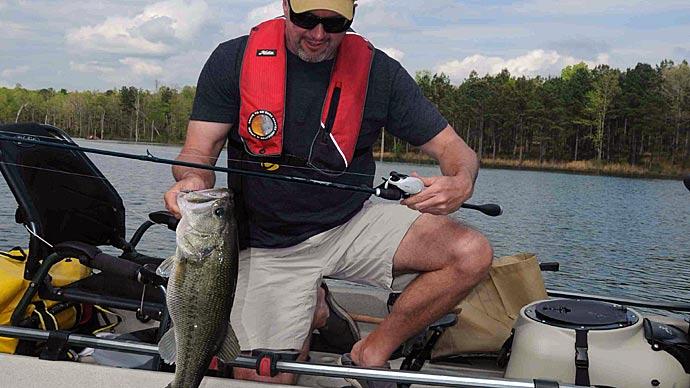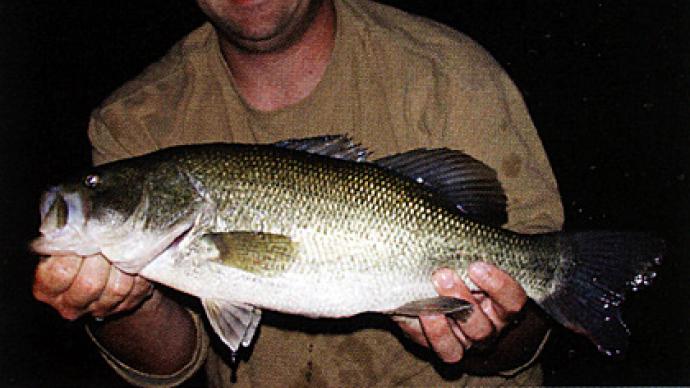
The stage is set. You're sitting in a crowd of a a hundred or more boats, patiently idling in a cramped cove, waiting for the official start of a tournament. The sweet smell of outboard fuel is so thick it's intoxicating. Chill bumps of anticipation run up and down you, even though you already know exactly where and how you're going to begin the day. Within minutes all the boats are screaming down the lake. Contestants are bundled up to avoid the morning chill and engine tachometers are laying on the red line. What's the big rush? You've got all day, right? Granted, we're in a race to get to our "key" spots, but more importantly we're after that critical early morning bite that may well account for most or even all of our tournament creel for the day.
Understanding the significance of the low-light periods in the life of bass and anglers alike is critical to success. This is not to say that you won't catch another fish beyond that point, or improve the weight you have already accumulated. But savvy anglers know that this is a critical time to execute their skills to maximize the advantage they have during this brief, though short, period while the orange stripe is still on the horizon. It is, however, so often the time when big bass honors are actually won and limits can be caught in record time.
Low-light periods are what I consider the first hour of sunrise and the final hour prior to sunset, or even days with heavy cloud cover and light intermittent rain showers. The basic importance of these periods is the activity level of bass, whereby they have a huge advantage over the meal they seek. As predators, bass take advantage of every opportunity to feed heavily when their food source is most vulnerable. This basically being when baitfish themselves are most actively feeding. They have relatively poor visibility with the diminished light and are bunched up in huge groups for protection in numbers, a "buffet" for bass if you will. We have all witnessed an early morning or late afternoon outing when suddenly the cove we are fishing begins to flicker with baitfish - to be suddenly followed by an explosion of bass all around the boat feeding on seemingly everything that moves. Huge bass actually herd shad like cattle, even to the point of forcing some of the baitfish onto dry land, in a desperate attempt to avoid the inevitable. (Adrenaline rush!)
Bass have much keener eyesight and lateral lines to detect movement, a super sense of smell, hearing, and it's all accompanied by their natural power. Stealth is built into their very design and it makes for pretty short work of their prey, especially during this brief time of day. They are actually gorging themselves while expending as little energy as required to fill their stomachs. This is sometimes the only major feeding period for the entire day, prior to the late evening feeding period where they will once again attempt to feed.
Once the sunlight begins to penetrate the water, the bass' advantage is diminished. They become more visible to their prey at a farther distance and are forced to seek cover for concealment and be content with ambushing unsuspecting victims as they wander into reach. As anglers, we can take advantage of low-light opportunities with a variety of baits, techniques, and strategies.
Since bass are actively feeding and seemingly hitting everything within their strike zone during these times, I prefer baits that can be presented quickly and with large coverage, such as spinnerbaits, lipless crankbaits - and by all means - topwaters. This is commonly known as "power fishing." These baits can be fished rapidly, with a good amount of water fished in a short period of time. Fishing in this manner will also allow you to come in contact with a greater number of fish during a short time, while presenting the possibility of a big fish making a mistake they might not otherwise make under different circumstances. This swings the odds well in your favor as they are literally "tuned out" to everything else taking place around them, which luckily includes you.
Now some will argue that this does not apply to the cold-water period, but in my experience it does. It's simply at deeper depths which the bass, and food source, are located during that period. This I have found especially true during frontal conditions where high bright skies will dominate for the remainder of the day. A well presented bait that mimics the available forage will get smacked in pretty short order, as long as you reach the proper depth where the majority of active fish are located.
The hard part is making yourself get up early on cold mornings when nothing is really at stake and making that run with the sun barely visible. Most anglers opt to catch their bass during the peak warming period of the day. I, too, am sometimes guilty of accepting the few bites I get to avoid the cold and waiting to be a little more comfortable during the winter period. But the fact is that bass must eat in winter as well as summer, although not as frequently with their depressed metabolism. They do however use the same tactics and advantages to feed, no matter what time of year or what depth they are holding in. At least some of those fish will feed early and late, and are just as willing to take a bait during this well-documented feeding period.
If there is an example that I can give you as to the dominance of the low-light period, it would be the one single day that it really rang home for me. During a Honey Hole Team Championship on Sam Rayburn several years back, an early season cold front rudely whipped through late on the last day of practice. We were so confident in what we had found that I couldn't imagine how a little fall front could change the entire pattern we had seemingly perfected in a body of water that size. The first morning of competition our program lasted approximately 45 minutes, with three solid fish caught and two more lost in the hydrilla. Not to worry, they will take a soft plastic, or crankbait in a little deeper water as the day goes on right? Wrong! No matter the depth, structure or presentation that we tried none received one bit of attention for the rest of the day. Here came Ellis to weigh in with the same three fish he started the day with. I was seriously beginning to question my basic fishing skills that I had worked so hard on for so many years. Jerry Dean with one brow raised just smiled, weighed my fish, and was kind to me when he could have really made sport of the situation. Trust me, I doubt if he will ever let that opportunity slip by again, but he did let me off easy on that occasion. Yes sir, big Honey Hole staff writer with all the answers weighing in 12-pounds of fish and 20-pounds of water was the thought I left the stage with. Quite frustrated and swallowing my pride I began to quiz other anglers that I had complete trust in their skills. To my surprise, they informed me that they too had experienced the exact same problem and had also been short of a limit.
At that moment all my focus for day two was placed on maximizing every single bite we could get the second morning during the low-light period to try and salvage at least a small check to take home. No matter how the rest of the day went, that 45-minute maximum effort was surely going to take place. The plan worked with completing a limit, but we still fell just short of my goal. I tried to evaluate the entire situation all the way home. My tail was definitely tucked between my legs as I pondered my poor showing for the entire three-hour drive.
The answer however was really very simple. The low-light period was something I took far too lightly on day one. Having caught fish by several different methods and in different depths of water in practice, gave me a sense of confidence that didn't prove to hold true in even slightly different conditions.
That day, of all the days I've spent on the water, finally drove home the significance of the low-light period in the life of a bass. And in the success or failure rate of an angler! Even with the most adverse of conditions the early morning bite still, although brief, did occur. On day one I completely failed to take advantage of the only dependable feeding pattern, which as it turned out was the actual key to winning the tournament. Someone else is now driving that boat that I had my sights so set on and well deserved by them for recognizing the winning pattern and not letting the slim but "winning" opportunity slip away.
We've all heard the old timers say that getting up early, fishing hard all day, and staying late is the major factor to becoming a successful angler and winning tournaments. After that event I understood exactly what they were talking about. I will never be guilty of complacency in a good early morning, or late evening spot again. When practicing for competition I now always assume that other contestants have found such an area, along with a way to make the fish bite. This fact alone may very well be the critical opportunity for me to get between them and first place.
So many times in the past I've heard the winner of the big bass honors say that the fish came on the first bite of the morning or that all their fish were caught in a one hour period. I once figured that couldn't be true so many times in a row. Not anymore. My confidence level is now at its peak as a new day begins. The sun finally rose in my stubborn little pea brain. Bass take advantage of advantages and the low-light periods of any day are the best times for their opportunities to peak. By using all their superior instincts, these predators are truly at the top of the food chain. For us, taking advantage of the few weaknesses they have, it is well worth setting the alarm clock or staying just a little later before calling it a day.
As I get older I'm counting on lessons learned to compensate for the decrease in physical stamina, but my desire will always be that of a teenager. These critters have me captured with their never ending lessons to be learned. I still love every minute of it and have been both proud and fortunate to share some of it with so many of you throughout the years.
The lesson learned, that low-light periods are key to a successful day on the water and should remain a standard fixture in your arsenal of bass-catching tactics.




